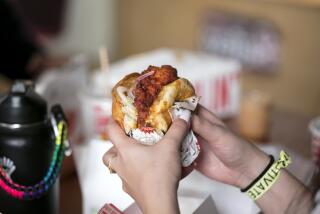Beware of friends and the night if you’re dieting, study says
- Share via
If there’s no caramel cheesecake, you are not likely to eat any. But plop one down on a table among a group of friends and forks are likely to come out. That’s a simple scene that embodies some of the complex mechanisms that make it so hard for people to lose weight and keep it off.
Researchers in England who were trying to sort out what makes dieters tempted and what makes them give into temptation looked at a group of 80 people -- mostly women -- over seven days, giving them phones and apps to record instances of temptation -- how they felt, what was happening and whether they took a bite.
In the week, they recorded 898 instances of temptation, which is more than 11 per person for the week.
As every dieter knows, keeping weight off is extremely difficult over the long term. And some of the factors the researchers reported Tuesday are expected: Being around friends, late-night cravings and alcohol have a major effect.
Other factors, as the makers of desserts and snacks surely know, include being tired. Who hasn’t stopped at the supermarket after a long day and bought foods they might better have left on the shelf?
But while some of those might seem obvious, the researchers are looking at exactly what’s going on in an effort to develop ways to empower people to resist temptation. Would it help, for example, if you had a phone app to record your feelings every time you happened upon a bowl of chips or an ad for ice cream?
“The findings help piece together the complex jigsaw surrounding the daily predictions of dietary temptations and help us to better understand how dietary temptations and lapses operate,” the researchers wrote in the journal Annals of Behavioral Medicine.
The 80 participants were part of a weight loss group or were dieting on their own. For a week, they were asked to fill out a phone diary each time they were tempted. The researchers said previous studies of willpower had been done in lab conditions; this one was done in “real” life.
The participants gave into temptation just over half the time, according to their diaries. They were particularly vulnerable at night and more likely to have an alcoholic drink than to eat a sugary snack.
British dietitians have ranked lack of willpower as more important to the development of obesity than genetics, the researchers said.
“In the fight against obesity, we need to help people become more aware of the various personal, situational and environmental factors that expose them to dietary temptations,” the researchers wrote. And then, they said, they need to develop skills to cope.
One thing that appeared to help the dieters was an ability to focus on their long-term goals.
No surprise, they reported they were more aware of their eating because they were carrying around the phones and had to record their temptations. And one of the limits of the work will surely ring true with dieters: They study was just seven days. What happened on the eighth day?
Twitter: @mmacvean
More to Read
Inside the business of entertainment
The Wide Shot brings you news, analysis and insights on everything from streaming wars to production — and what it all means for the future.
You may occasionally receive promotional content from the Los Angeles Times.










